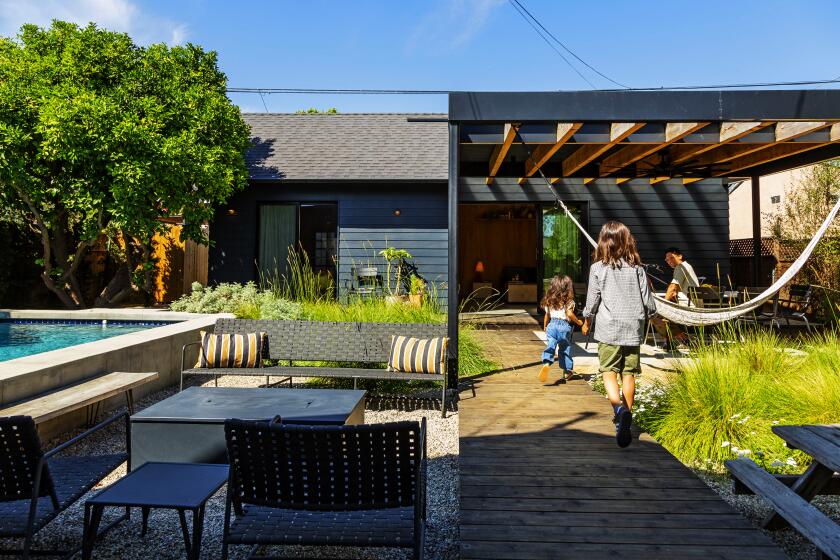On the 18th hole
- Share via
AN office, tidy but furnished with odds and ends, has been established in the crumbling shell of a building in Pittsburgh’s mostly African American Hill District. Neighboring storefronts contain the ghostly remains of a barbershop and an eatery -- onetime social hubs that have fallen silent as the neighborhood awaits redevelopment.
This much is visible as soon as theatergoers enter the Mark Taper Forum for August Wilson’s newest drama, “Radio Golf.” It’s almost as if the set were talking, as if this story were so eager to tell itself that it couldn’t be bothered to wait for the lights to go down. And one of the most significant themes is already being expressed: the desperation of renewal deferred.
Aching and yearning, this emotion throbs through all nine of the preceding plays in Wilson’s cycle chronicling the African American experience in the 20th century. The writing itself has stretched across roughly a quarter of a century, as 60-year-old Wilson has turned out stories that trace a line from freed slaves in the 1900s awaiting true emancipation to 1990s go-getters on the fast track to success.
The latter are the subjects of “Radio Golf,” the cycle’s concluding segment. Harmond Wilks (Rocky Carroll), scion of a successful real estate family, is finalizing plans for a major urban renewal project -- a mixed-use housing and retail complex -- while preparing to announce his candidacy for mayor.
Wilks seems to value history; he admires the embossed tin ceiling of his makeshift office, and he wants to rename a health center after the city’s first African American registered nurse. These interests, however, are lost on his pal and business partner, Roosevelt Hicks (James A. Williams), who’s restless to accumulate wealth and power. Tellingly, Roosevelt is obsessed with golf, a game typically associated with rich white men, and in the course of the story he will go on to host a radio show about the pastime.
David Gallo’s set vividly locates the activities in the Pittsburgh neighborhood that shaped the young Wilson and has provided the milieu for all but one of the cycle’s plays. Parts of this neighborhood will have to be torn down to make way for redevelopment. Will the future be built upon the history symbolized in the targeted buildings? Or will the past merely be razed?
Insinuating themselves into the office’s day-to-day activities -- and, thus, into this debate -- are the mysterious Elder Joseph Barlow (Anthony Chisholm), who claims to own one of the homes scheduled to be torn down; the affable Sterling Johnson (John Earl Jelks), who comes looking for construction work; and Wilks’ well-manicured, pragmatic wife, Mame (Denise Burse).
The characters are talkers, their thoughts tumbling forth sometimes with poetic grace, sometimes with the coarseness of everyday language -- yet always sounding deeply urgent and insistent, as if they were blues refrains.
Chisholm, a longtime veteran of Wilson’s plays, is particularly adept at the style. Squinting and scowling, or relaxed and jovial, he functions as a griot -- a storyteller and heritage minder in West African tradition -- who’s doing what he can to keep the past alive. The home to which he lays claim is the onetime dwelling of Aunt Ester, a figure invoked in previous plays and a character in “Gem of the Ocean,” presented two years ago at the Taper. Wilson once told American Theatre magazine that “Aunt Ester carries the memory of all Africans, the memory of the ancestors.”
Thus, “Radio Golf,” like all the plays in the cycle, looks back to a homeland and a heritage ripped away by slavery.
Tightly interwoven with the preceding plays yet entirely understandable on its own, “Radio Golf” is funny, thoughtful and reverberant. Themes, ideas, even bits of lines from the other plays can be heard here, as the story presses its characters to decide who they are and what they stand for.
The second act begins to strain as Wilson tries to bring not just this story but his whole cycle to a close. Yet director Kenny Leon maintains a beautiful balance as the action hovers between the ancient, almost magical pull of Africa and the greedy, clamoring demands of the still-not-united United States.
The completion of the cycle and this early introduction to its final chapter, just months after it premiered at Yale Repertory Theatre, make “Radio Golf” a fitting valedictory for Gordon Davidson, now departed after leading the Taper through 38 seasons. This is the last play of the final season he programmed, and it’s exactly the sort of socially inquisitive drama he championed.
And so a line delivered by Harmond, as he envisions himself at the forefront of a reconciled city, echoes well beyond “Radio Golf’s” borders. “It’s not about being white or black,” he says. “It’s about being American.” Does America really believe that? That part of the story remains to be written.
*
‘Radio Golf’
Where: Mark Taper Forum, 135 N. Grand Ave., Los Angeles
When: 8 p.m. Tuesdays through Fridays, 2:30 and 8 p.m. Saturdays, 2:30 and 7:30 p.m. Sundays
Ends: Sept. 18
Price: $34 to $52
Contact: (213) 628-2772 or www.MarkTaperForum.org
Running Time: 2 hours, 30 minutes
Denise Burse...Mame Wilks
Rocky Carroll...Harmond Wilks
James A. Williams...Roosevelt Hicks
John Earl Jelks...Sterling Johnson
Anthony Chisholm...Elder Joseph Barlow
By August Wilson. Director Kenny Leon. Set David Gallo. Costumes Susan Hilferty. Lights Donald Holder. Original music Kathryn Bostic. Sound Jon Gottlieb. Production stage managers Narda E. Alcorn, Mary K Klinger.
More to Read
The biggest entertainment stories
Get our big stories about Hollywood, film, television, music, arts, culture and more right in your inbox as soon as they publish.
You may occasionally receive promotional content from the Los Angeles Times.











